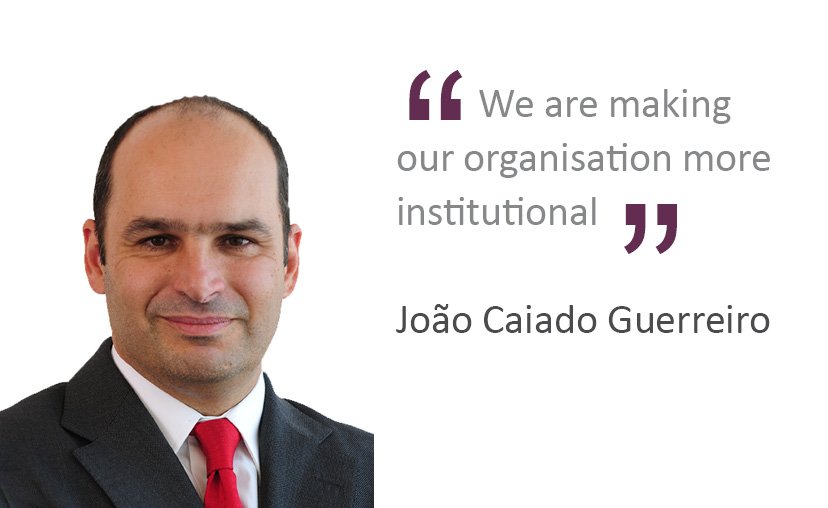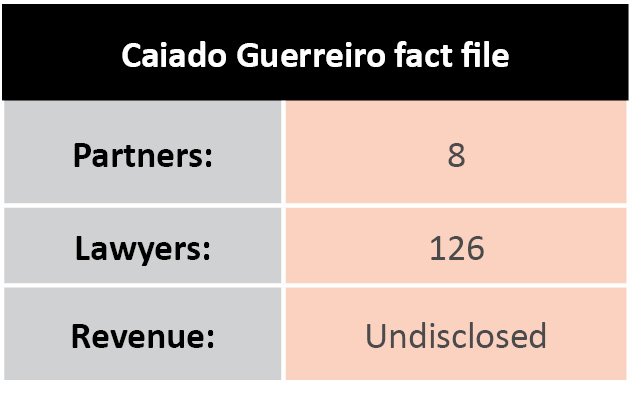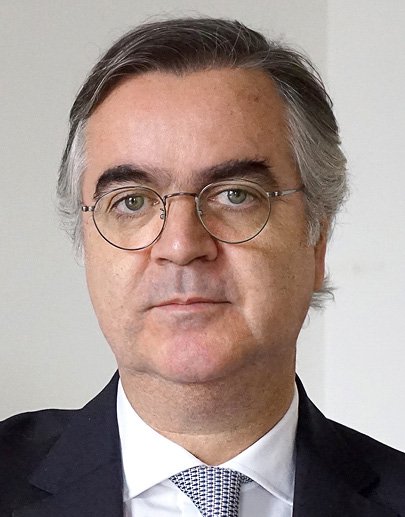Ready for battle

Caiado Guerreiro has grown substantially in the last year, but the firm is well aware that it must adapt itself to meet the challenge posed by new competitors
There has been significant growth at Caiado Guerreiro in the last year – it is now the sixth largest Portuguese firm by headcount – but managing partner João Caiado Guerreiro knows there is no time for complacency. Not only are there widespread concerns among managing partners in Lisbon that the Portuguese economy could be facing a downturn in the near future, but the amount of breathing space in the country’s legal market is reducing at a rapid rate. Firms from the UK and Spain have set up shop in Lisbon in the last couple of years, and this is before we get on to the subject of the ‘Big Four’ – a number of which have planted their flag in the Portuguese legal landscape in recent times. If that wasn´t enough, there are also whispers that some US firms are considering setting up shop in Lisbon too.
While Caiado Guerreiro has enjoyed “double-digit” revenue growth in the last year, the firm’s managing partner is level-headed enough to acknowledge there are clouds on the horizon. “In Portugal we are always hoping that the sky won’t fall on our heads, and our very large public debt is a looming danger,” remarks Caiado Guerreiro, though he adds that the outlook for the coming year is positive. Yet, in a reference to the increasingly competitive nature of the legal market, and specifically the threat posed by the ‘Big Four’, Caiado Guerreiro says the firm is planning to make some necessary changes to the internal workings of the firm. “We plan to improve our infrastructure, and to further develop our offering as a one-stop-shop as we compete more and more with the big auditing companies and other companies that offer the same services,” he explains.
This process will involve an overhaul of the firm’s management structure. “We are making some changes to our internal organisation, making it more institutional,” says Caiado Guerreiro. He argues that, while this will allow the firm to improve its capacity for growth, the trade-off is less flexibility. “One big advantage of having a more institutional structure is that we will become more capable of growing in the future, but inevitably in this process we will lose some flexibility.”
‘A very good school’
The firm’s approach involves betting heavily on young talent. Caiado Guerreiro says the firm has always preferred to nurture talent on the inside and pursue ‘organic growth’, rather than making lateral hires. “We don’t make many lateral hires, but we always aim to hire the best students coming out of university,” he says. And this is the key point, according to Caiado Guerreiro. “If you’re not capable of great achievements at the age of 23, you’re not going to be capable at 53,” he argues. Caiado Guerreiro’s philosophy involves trying to give young lawyers the feeling that they have a key role to play in the firm. “We like to give them responsibility within the firm, and we’re also very flexible,” he says, while also claiming that the firm is “known as a very good school, we do have that reputation and that helps”.  The net result of this a Dual-qualifiedpproach is that, according to Caiado Guerreiro, the firm’s lawyers have a strong sense of loyalty and a good retention rate. He adds that the firm’s lawyers also help to attract additional talent. “I think the best advertisement for our firm are the people who work here,” he remarks. Caiado Guerreiro currently has 126 lawyers – of which eight are partners – an increase of 15 per cent on the previous year’s headcount. Caiado Guerreiro says the growth in lawyer numbers is largely attributable to increases in foreign investment, as well as more litigation and arbitration, as well as a rise in real estate-related matters.
The net result of this a Dual-qualifiedpproach is that, according to Caiado Guerreiro, the firm’s lawyers have a strong sense of loyalty and a good retention rate. He adds that the firm’s lawyers also help to attract additional talent. “I think the best advertisement for our firm are the people who work here,” he remarks. Caiado Guerreiro currently has 126 lawyers – of which eight are partners – an increase of 15 per cent on the previous year’s headcount. Caiado Guerreiro says the growth in lawyer numbers is largely attributable to increases in foreign investment, as well as more litigation and arbitration, as well as a rise in real estate-related matters.
The recruitment drive is set to continue. In the coming months, the firm is planning to reinforce its public law, litigation, tax and technology practices. “We’ve been looking to hire people with dual qualifications, as this isn’t that common,” explains Caiado Guerreiro. “We’re particularly interested in graduates of engineering with law, or pharma and law – since the Bologna system [for European education] was implemented, these profiles aren’t as rare as they used to be.”
The firm’s desire to grow these particular areas of practice reflects current developments in the Portuguese market, according to Caiado Guerreiro, who says the country has seen a significant increase in litigation, for example. “We have quite a few large cases valued in the hundreds of millions,” he says. Meanwhile, with regard to public law and tax, Caiado Guerreiro says there has been an increase in demand from clients, due to the fact Portugal is attracting plenty of foreign investment: “The state of the Portuguese market in many ways is very positive,” Caiado Guerreiro says. He adds that the country’s non-habitual resident regime and the golden visa scheme have helped to raise its profile on the world stage. “These two schemes have turned the country around, and Lisbon is finally being recognised as a fantastic place to be,” he argues.
This raised profile has meant the firm has experienced an increase in demand for tax planning advice, particularly from Latin American, Middle Eastern and African clients. Caiado Guerreiro says that the firm has advised large international clients based in Africa, the Middle East and Latin America on tax planning matters. Meanwhile, the firm has represented real estate consultancy Imócompletissimo in litigation against the Portuguese tax authority.
Caiado Guerreiro claims many international businesses are also attracted to Portugal thanks to its highly-educated workforce, first-class infrastructure and quality of life. “Many international companies are outsourcing accounting and other functions to Portugal,” he says, citing Nestlé’s new services centre at Linda-e-Velha outside Lisbon as a prominent example of Portuguese investment by a global blue-chip. “We have great infrastructure and a very well-trained workforce, including good technicians and engineers – Portugal also offers excellent conditions for tourism and living,” he says.
In addition, Portugal also boasts a very healthy start-up environment, with a number of technology companies valued around the €1 billion mark. “For a country with a population of just over ten million this is fantastic,” says Caiado Guerreiro. He adds that real estate and tourism are two sectors that are generating growth and generating demand for legal advice. “Real estate and tourism moves everything,” Caiado Guerreiro says. “Like any investment, deals in these sectors generate tax planning, regulatory and other associated work,” he says. Meanwhile, M&A work has also increased, while other recent corporate work included advising Baker Tilly on the reorganisation of its Portuguese businesses.
With regard to the outlook for the future, Caiado Guerreiro says the firm wants to “keep hiring the brightest minds from university”. He adds: “This has consistently been our policy, and it’s working; with double-digit revenue growth there is nothing that makes me think we should change our strategy.” The firm is also keeping a close eye on developments on the technology front, although Caiado Guerreiro believes that the current offerings in the market are more suited to UK and US firms, and those operating in other common-law jurisdictions. “We spend money on technology every year, but I believe that artificial intelligence is overrated for jurisdictions like Portugal,” he says. “It must be of great help in jurisdictions where you have vast amounts of discovery work, but I haven’t seen anything that has blown my mind away.”














